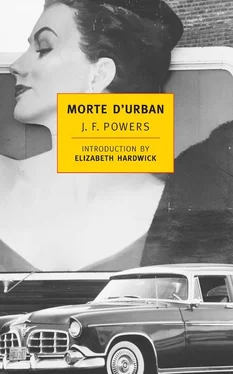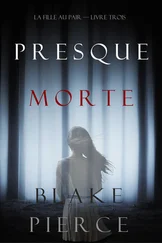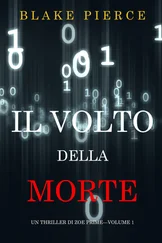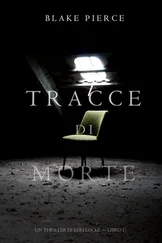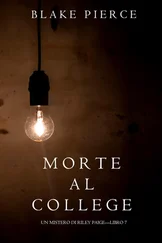FR JOHN: Where’d they go?
RECTOR: I understand they’ve migrated to the east of us, but they’ll be back next year. House seems awfully quiet at night.
FR URBAN: We still have a mouse.
FR JOHN: Yes, there’s one lives in the wall between our rooms.
RECTOR: Does it bother you?
FR JOHN: Oh no.
RECTOR: Does it bother you , Father?
FR URBAN: Oh no.
RECTOR: Because if it does, maybe we can get rid of it. You have a mousetrap, Brother? No? Well, better buy one. We can always find use for it. And if there’s anything else you need, Brother, let me know. So much for that. Now then.
More than forty religious orders would be represented at the upcoming Vocations Fair at the Catholic high school in Ostergothenburg. The Rector, after making several inquiries, had been invited to participate, and permission to do so had since been received from Chicago. So the Clementines would have a booth at the Fair. They would display their publications, among them the brochure, and would be ready to talk turkey with likely prospects. Probably most orders would let it go at that, and hope for the best. As always, the small orders would be at a disadvantage. The Clementines would not be favored by the location of their booth (between the Jesuits and the Dominicans), but the Rector and Brother Harold had come up with something that they hoped would not only redress the balance in their favor but would appeal to youngsters of high school age — an I.Q. test .
RECTOR: I don’t have to tell you that everybody likes to take an I.Q. test. Now here are some of the questions. Please listen carefully. “Who was the Holy Founder of the Order of St Clement?”—“St Clement of Blois.” You realize, of course, that the questions and answers will be scrambled on the page. “Who was St Clement of Blois?”—“A Frenchman of noble birth.” Too easy, you think, but wait. “Was St Clement of Blois also known as Pope Clement?”—“No.” “Was St Clement of Blois a martyr?”—“Yes.” You can see it’s getting more difficult — and don’t forget these are high school students. “How did St Clement of Blois die?”—“He was slain by fanatics.” “How did fanatics slay St Clement of Blois?”—“They crushed him under a millstone.” Now a lot of ’em will give that answer to the previous question—“How did St Clement of Blois die?” They’d be right, of course, but it wouldn’t be the right answer. That’ll throw a lot of ’em, and some of the other questions are just as tricky. Well, that’s how it works. There are twenty questions in all. There are twenty-one answers, however. One of the answers, H 2O, has nothing to do with the questions. Now here’s how we grade the test. First we multiply the number of correct answers by ten, and then we subtract the number of minutes the student takes to complete the test. Let’s say a student gets eighteen right, and takes seven minutes. Ten times eighteen is a hundred and eighty. Subtract seven. That gives the student an I.Q. of 173. Now here’s what we’ll use to time them. Just an ordinary kitchen timer. I bought it today. Brother Harold’s been wanting one for some time, and when this is over, I’m going to let him have it. Well, what do you think? Father Urban?
FR URBAN: Should make for conversation.
RECTOR: That’s the idea, exactly — to get these kids talking and thinking about the Order. Even if they don’t do anything about it, they’ll learn a few facts they ought to know. You’d say it’s O.K. then?
FR URBAN: Yes.
RECTOR: Father John?
FR JOHN: Yes.
RECTOR: Good. I was afraid maybe you wouldn’t like it. Now then. As you know, since you voted, this was an election year. The outcome I now make known to you, as required by the Rule. Our Holy Founder, you’ll remember, was very clear on this point, and so we’ve never had the kind of situation that he aimed to prevent. Of course, communications are better nowadays. But be that as it may. The honor goes to one of our best men, as it should — and indeed as it always does, thanks be to God. About that I don’t think there’ll be much disagreement here. At least I hope not. I have the honor, then, the special honor, I might add…
The Rector distributed copies of Regula S. Clementis necnon Rituale Ordinis Ejus.[1]
RECTOR: Urbanus? [2]
Urban?
FR URBAN: Urbanus sum .
I am Urban.
RECTOR: Surge, Urbane. Si contigerit (quod Deus advertat) te carne esse depressum, peccato captivum, ignorantia caecum, exterioribus deditum, oremus : [ Orant .]
Rise Urban. [Urban does.] In the event (which God forbid) that you are depressed by the flesh, a prisoner to sin, blinded by ignorance, in bondage to creatures and things, let us pray: [They pray.]
… utinam suaviter purgeris, ardenter afficiaris, misericors fias.
That you be gently purged, ardently moved, and made merciful.
FR URBAN: Amen .
Let it be so.
RECTOR: Scisne privatum dominum temerarios servos nutrire?
Do you know that a familiar master breeds contemptuous servants?
FR URBAN: Scio .
I do.
RECTOR: Num oportet me monere te de periculis in marsupiis latentibus?
Need I speak to you of the dangers in pockets?
FR URBAN: Non oportet. De marsupiis audivi, atque ea vitare volo tamquam occasiones peccatorum, etsi ipsa marsupia non sunt mala .
No. Of them I have heard and will them avoid as occasions of sin, though in themselves they are not evil.
RECTOR: Quae sunt tria angula veritatis?
What are the three corners of truth?
FR URBAN: Ratio, qua nos discutimus. Affectus, quo aliis miseremur. Puritas, qua ad invisibilia sublevamur .
Reason, by which we examine ourselves. Love, by which we sympathize with others. Purity, by which we are lifted to invisible heights.
RECTOR: Putas, primo homini profuit, licet ipse non libenter peccavit, quod se per uxorem, tanquam per carnis infirmitatem, defendit? Aut primi Martyris lapidatores, quoniam aures suas continuerunt, per ignorantiam excusabiles erunt?
Did it profit the first man when he said he did not sin willingly, and advanced his wife, that is, the weakness of the flesh, in his defense? Will the stoners of the first martyr, because they would not listen, be pardoned for their ignorance?
FR URBAN: Non erunt. Qui studio et amore peccandi a veritate se sentiunt alienatos, et infirmitate et ignorantia pressos, studium in gemitum, amorem in moerorem convertant, infirmitatem carnis fervore justitiae vincant, ignorantiam liberalitate repellant .
Those who are estranged from truth by passion and pleasure in sinning, and who are overcome by weakness and ignorance, must surrender their passion to regret, their pleasure to sorrow, and conquer the infirmities of the flesh with the fire of justice, and meet ignorance with liberality.
RECTOR: Cur?
Why?
FR URBAN: Ne si nunc egentem, nudam, infirmam veritatem ignorant, cum potestate magna et virtute venientem, terrentem, arguentem, sero cum rubore cognoscant, frustra cum tremore respondeant : Quando te vidimus esurientem, aut sitientem, aut hospitem, aut nudum, aut infirmum, aut in carcere, et non ministravimus tibi? Cognoscetur certe Dominus judicia faciens, qui nunc ignoratur misericordiam quaerens. Denique videbunt in quem transfixerunt: similiter et avari quem contempserunt . Beati enim mundo corde, quoniam ipsi Deum videbunt.
Otherwise, if they fail to recognize truth as it appears now, needy, naked, and weak, they may not know it until it comes with great power and glory, terrible and indicting, and they may then redden and in vain answer in trembling voices: When did we see thee hungry or thirsty or a stranger or naked or sick or in prison and did not minister to thee? The Lord shall be known when he judges, if he is not known when he seeks mercy. Then they shall look on him whom they pierced with a lance, and likewise the avaricious on him whom they despised in their hearts. Blessed are the pure in heart: for they shall see God .
Читать дальше
